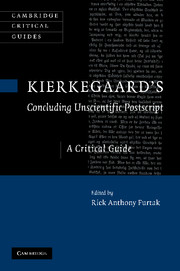Book contents
- Frontmatter
- Contents
- List of contributors
- Acknowledgments
- List of abbreviations
- Introduction
- 1 The “Socratic secret”: the postscript to the Philosophical Crumbs
- 2 Kierkegaard's Socratic pseudonym: A profile of Johannes Climacus
- 3 Johannes Climacus' revocation
- 4 From the garden of the dead: Climacus on interpersonal inwardness
- 5 The Kierkegaardian ideal of “essential knowing” and the scandal of modern philosophy
- 6 Lessing and Socrates in Kierkegaard's Postscript
- 7 Climacus on subjectivity and the system
- 8 Humor and irony in the Postscript
- 9 Climacus on the task of becoming a Christian
- 10 The epistemology of the Postscript
- 11 Faith and reason in Kierkegaard's Concluding Unscientific Postscript
- 12 Making Christianity difficult: The “existentialist theology” of Kierkegaard's Postscript
- Bibliography
- Index
- References
7 - Climacus on subjectivity and the system
Published online by Cambridge University Press: 04 August 2010
- Frontmatter
- Contents
- List of contributors
- Acknowledgments
- List of abbreviations
- Introduction
- 1 The “Socratic secret”: the postscript to the Philosophical Crumbs
- 2 Kierkegaard's Socratic pseudonym: A profile of Johannes Climacus
- 3 Johannes Climacus' revocation
- 4 From the garden of the dead: Climacus on interpersonal inwardness
- 5 The Kierkegaardian ideal of “essential knowing” and the scandal of modern philosophy
- 6 Lessing and Socrates in Kierkegaard's Postscript
- 7 Climacus on subjectivity and the system
- 8 Humor and irony in the Postscript
- 9 Climacus on the task of becoming a Christian
- 10 The epistemology of the Postscript
- 11 Faith and reason in Kierkegaard's Concluding Unscientific Postscript
- 12 Making Christianity difficult: The “existentialist theology” of Kierkegaard's Postscript
- Bibliography
- Index
- References
Summary
Kierkegaard is usually taken to be a critic of Hegelian philosophy, meaning Hegel himself and the Danish Hegelians. Emphasis has been on Hegel himself, who is better known and more important to contemporary thought than his followers. This emphasis has recently been challenged by a two-pronged argument from Jon Stewart. Psychologically speaking, the argument goes, Kierkegaard's critique has the Danish Hegelians but not Hegel in mind; and philosophically speaking, that critique does not in any case make substantive contact with Hegel's own thought.
But the double argument is doubly mistaken. The psychological argument, which is only of interest to intellectual biography, is a non sequitur. That Kierkegaard may have a particular Danish formulation of a Hegelian view in mind does not mean that he does not also have Hegel himself in mind. More importantly in terms of philosophical significance, even if in a given case Kierkegaard has only a Danish Hegelian in mind, it does not follow that the critique fails effectively to engage Hegel's own thought. Stewart's attempts to show this in particular cases independently of the psychological thesis regularly fail.
A full study of the critique of Hegelian thought in Kierkegaard's writings would require examination of many texts, as evidenced by both Stewart's and Thulstrup's books. Sometimes it is explicit, sometimes implicit; sometimes it is pseudonymous, sometimes not.
Keywords
- Type
- Chapter
- Information
- Kierkegaard's 'Concluding Unscientific Postscript'A Critical Guide, pp. 132 - 148Publisher: Cambridge University PressPrint publication year: 2010
References
- 1
- Cited by

